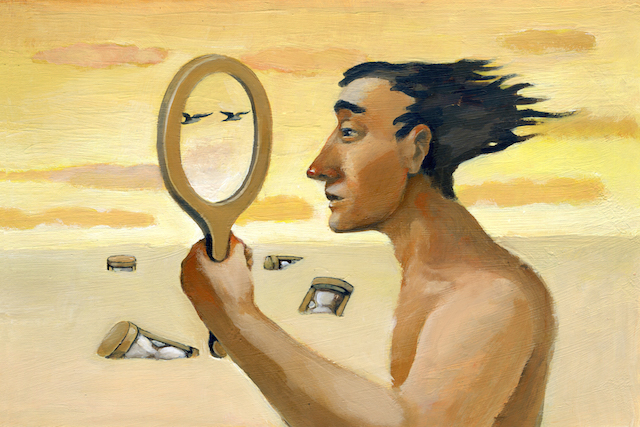
“Setting an example is not the main means of influencing others, it is the only means.” ~Albert Einstein
When I was younger, I had a lot of opinions about what other people needed to change.
“Why can’t people conserve more?” “Why can’t people stop throwing cigarette butts on the ground?” “Why can’t so-and-so stop being so annoying?”
Et cetera, et cetera, et cetera.
I’ve recently realized that as I focused on all of the things that others needed to do, I was avoiding taking a look at my own very real flaws and failures.
I used single-use plastic containers for smoothies and coffee. I had a car and drove a lot, often when I could have walked, biked, or taken public transit. I used air travel, frequently. I didn’t ever shop at thrift stores or make an effort to reuse things. And I also, um, was very critical of others, and myself.
In short, I had plenty of issues of my own.
There is a quote by Jacob M. Braude that reads, “Think about how hard it is to change yourself. Then maybe you will understand why it is impossible to change other people.”
Not only was it impossible for me to force another person to change, I was also avoiding the impact I could have made by changing myself.
This is true in so many areas of life.
Consider the person who always dates “horrible” or “crazy” people. We always blame the other person and think, “Why do I have such bad luck with men/women?” It’s rare that a person ever looks at themselves and considers that maybe there is something about them that is attracting this type of person—that maybe, in fact, we even subconsciously choose to get involved with screwed-up people so we can point the finger at them instead of confronting our own intimacy issues and asking ourselves why we are avoiding real relationships (or friendships).
So many people also complain about how “society” needs to change. Yet all of us doing the complaining make up society.
If we want change, we are the ones that need to change, every one of us.
This isn’t necessarily pleasant to hear. Because, of course, as long as we complain about what other people need to do, we avoid the discomfort and effort of looking at ourselves and making changes in our own lives.
We complain that people are always on their phones. Yet all of us are on our phones, constantly. We complain that the political process is corrupt, yet how many of us run for office, vote regularly, or even dedicate time to really understanding the issues? We complain that we never talk to our friends, but how many of us make the effort to reach out and really listen to what is going on in someone else’s life?
I’ve realized that for a very long time, I’ve blamed other people for my circumstances; and maybe circumstances did have an impact in some ways. That job that didn’t work out, those traumas that happened in the past. Yes, they are part of who I am.
But the truth is that as I look back at my past, almost all of the instances in which I’ve had a conflict or something “bad” done to me by someone else, could have been avoided if I had taken responsibility for myself and not given my power away to someone else.
For example, I’ve recently taken two international backpacking trips. After the first one, I stayed with relatives temporarily to get re-established in the US, and it ended with conflict and hurt feelings because boundaries and expectations were not clearly defined.
And while my first reaction was to feel sorry for myself and tell myself how “mean” they were, the truth is that I should have been more proactive about either having a discussion to determine a clear agreement or budgeting better and supporting myself.
I’ve realized that expecting others to care for me or take responsibility for my life can only end in disappointment and disempowerment for me.
I think in the past, because I was living according to others’ expectations of me and because I was afraid of intimacy and really diving into life, I subconsciously was not taking full responsibility for myself and on a certain level was expecting other people to care for me and support me.
It’s scary to take full responsibility for ourselves and our lives. In a way, it’s easier not to try, because what if we fail, or what if people don’t like the real “us,” the one we keep hidden? Because hey, if they don’t like us, at least it isn’t the real “us” they’re rejecting, and we can pretend that we “didn’t really care” anyway.
So many of us live with our dreams and selves tucked away and just float by with what life gives us, and criticize others or the state of the world instead of working on ourselves or taking steps to fix those things we can change.
The best realization I have had recently, which has helped me avoid despair in the midst of much dark environmental and political news and trying personal times, is that I can restore my own sense of personal power and commit myself to things that I can change.
That might mean pledging to never use a plastic bag at the grocery store again, bringing a Mason jar instead of using a disposable cup for beverages, or trying to use more kindness and less judgment toward others in my personal life. I can walk through the fire and take ownership of myself and my life.
Now, I’m not saying that it’s not worthwhile to fight for causes one believes in or speak out against injustice. But it’s important to look at ourselves first and examine what flaws we may be harboring in our own hearts. As spirituality author Marianne Williamson once humorously wrote, “It amuses me how angry I used to get when people wouldn’t sign my peace petitions.”
Williamson herself is an example of this principle. One assumes she did not find a great deal of success in angrily yelling at people to sign her peace petitions. Yet once she decided to look inward and change herself, and examine her own human failings and weaknesses, she gained spiritual knowledge that has impacted millions and helped them find peace within their own hearts.
Ultimately, we can try to communicate and share with others, but we can’t change them.
On the other hand, we always have the option to look inward, claim our power, and take the step of changing ourselves. We can make ourselves into the type of person we keep wishing others would be and do the things we keep wishing others would do. And while it may be scary, it should also be an encouraging thought.
Because the truth is that the power for change, either for ourselves or the world, is not anywhere “out there”—it has always been inside of us.
About Shannon Brown
Shannon spent several years as a writer and editor at a public health agency in Washington, DC. She then spent a total of eight months over the past two years backpacking through Europe, and is now a writer and yoga teacher in Brooklyn, NY. Find her on Instagram (@shannonb_808) or her blog, balanced-perspective.com.













 Though I run this site, it is not mine. It's ours. It's not about me. It's about us. Your stories and your wisdom are just as meaningful as mine.
Though I run this site, it is not mine. It's ours. It's not about me. It's about us. Your stories and your wisdom are just as meaningful as mine.
Love this. Thank you. It’s amazing how much power we give away waiting for others to change.
Yup! And often, they simply never will–and that’s ok, for them. Thanks for commenting
Great stuff. Anyone in a 12 step program would appreciate this. We learn, grant me the serenity to accept the things we cannot change (others), the courage to change the things we can (ourselves) and the wisdom to know the difference.
Very important lesson. We have much more control over changing ourselves than changing others, and we need to make sure we focus on how we can change before all else. Thanks for sharing.
Thanks you